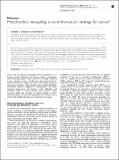| dc.contributor.author | Baffy, Gyorgy | |
| dc.contributor.author | Derdak, Z | |
| dc.contributor.author | Robson, Simon Christopher | |
| dc.date.accessioned | 2013-03-26T17:40:33Z | |
| dc.date.issued | 2011 | |
| dc.identifier.citation | Baffy, G, Z Derdak, and S C Robson. 2011. Mitochondrial recoupling: a novel therapeutic strategy for cancer? British Journal of Cancer 105(4): 469-474. | en_US |
| dc.identifier.issn | 0007-0920 | en_US |
| dc.identifier.uri | http://nrs.harvard.edu/urn-3:HUL.InstRepos:10465033 | |
| dc.description.abstract | Recent findings link metabolic transformation of cancer cells to aberrant functions of mitochondrial uncoupling proteins (UCPs). By inducing proton leak, UCPs interfere with mitochondrial synthesis of adenosine 5′-triphosphate, which is also a key determinant of glycolytic pathways. In addition, UCP suppress the generation of superoxide, a byproduct of mitochondrial electron transport and a major source of oxidative stress. The near ubiquitous UCP2 becomes highly abundant in some cancers and may advance metabolic reprogramming, further disrupt tumour suppression, and promote chemoresistance. Here we review current evidence to suggest that inhibition of mitochondrial uncoupling may eliminate these responses and reveal novel anti-cancer strategies. | en_US |
| dc.language.iso | en_US | en_US |
| dc.publisher | Nature Publishing Group | en_US |
| dc.relation.isversionof | doi:10.1038/bjc.2011.245 | en_US |
| dc.relation.hasversion | http://www.ncbi.nlm.nih.gov/pmc/articles/PMC3170958/pdf/ | en_US |
| dash.license | LAA | |
| dc.title | Mitochondrial recoupling: a novel therapeutic strategy for cancer? | en_US |
| dc.type | Journal Article | en_US |
| dc.description.version | Version of Record | en_US |
| dc.relation.journal | British Journal of Cancer | en_US |
| dash.depositing.author | Baffy, Gyorgy | |
| dc.date.available | 2013-03-26T17:40:33Z | |
| dc.identifier.doi | 10.1038/bjc.2011.245 | * |
| dash.contributor.affiliated | Robson, Simon | |
| dash.contributor.affiliated | Baffy, Gyorgy | |


